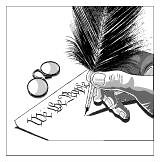 In 1843, Mellen Chamberlain interviewed Captain Levi Preston, a 91 year old American who had fought at Concord and Lexington in the Revolutionary War. The Captain's answer provides a good insight into the minds of the men who fought. They were perhaps not so swayed by individual taxes, perceived oppression or the philosophis of Locke and others.
In 1843, Mellen Chamberlain interviewed Captain Levi Preston, a 91 year old American who had fought at Concord and Lexington in the Revolutionary War. The Captain's answer provides a good insight into the minds of the men who fought. They were perhaps not so swayed by individual taxes, perceived oppression or the philosophis of Locke and others."Captain Preston, why did you go to the Concord fight, the 19th of April, 1775?"
"Why did I go?"
Yes, my histories tell me that you men of the Revolution took up arms against intolerable oppressions. What were they?"
"Oppresions?" Captain Preston asked. "I didn't feel them."
"What, were you not oppressed by the Stamp Act?"
"I never saw one of those stamps...and I am certain I never paid a penny for one of them."
"Well, what then about the tea-tax?"
"Tea-tax! I never drank a drop of the stuff, the boys threw it all overboard."
"Then I suppose you had been reading Harrington or Sidney and Locke about the eternal principles of liberty."
"Never heard of 'em. We read only the Bible, the Catechism, Watts' Psalms and Hymns, and the Almanack."
"Well, then, what was the matter? and what did you mean in going to the fight?"
"Young man, what we meant in going for those Redcoats was this: we always had governed ourselves, and we always meant to. They didn't mean we should."
The Captain hints at a yearning for liberty and freedom which was not reactionary in nature nor was it born of philosophical debate. It seems a matter of cultural heritage, handed down from father to son as he emphasizes, "..we always had governed ourselves, and we always meant to." However, even this, in the absence of true oppression, is hardly worth the bloodshed that would surely result from an obscure colony taking on the most powerful military force in the world belonging to an empire upon which the sun never set.
The political text of early America was the bible. The main speakers in the debate were pastors speaking from the pulpit. The message was that man was created by God for His glory. We were to be governed internally by Christ, answering to God rather than to man. These were held as inaliable rights endowed to men by their Creator. These points were discussed and debated in churches, in homes and in the public arena, with many of the leading thinkers returning always to their bible as the foundation of their beliefs.
As I think on my purpose in education, I can think of no higher purpose than that of liberty. This word has a considerable history, one which I may explore in subsequent posts. For now, I will explain only what this word means to me in terms of education. For me, it is roughly synonymous with "Christian self-government." Webster's 1828 defines it thus:Freedom from restraint, in a general sense, and applicable to the body, or to the will or mind. The body is at liberty, when not confined; the will or mind is at liberty, when not checked or controlled. A man enjoys liberty, when no physical force operates to restrain his actions or volitions.Christian liberty is not anarchy. We may reject notions of outside force or control as governing our actions, even as we submit to their authority. Sovereignty rests neither in the outside force of the state nor within the individual, but with God. The Christian is governed internally through the indwelling of the Holy Spirit and it is in this state that man has the purest expression of liberty. Scripture summarizes this concept more clearly:
And I will walk at liberty; for I seek thy precepts.Isaiah tells us:
--Psalm 119:45
The Spirit of the Lord GOD is upon me; because the LORD hath anointed me to preach good tidings unto the meek; he hath sent me to bind up the brokenhearted, to proclaim liberty to the captives, and the opening of the prison to them that are bound; To proclaim the acceptable year of the LORD,Notably, Jesus is handed this very passage when he speaks in the synagogue and he announces to His audience that the scripture has been fulfilled in their ears (Luke 4:18). Through Christ's sacrifice, we have been set free from the bondage of sin. As I educate my daughter, my primary goal is to teach her to read the scripture for herself. This entails both the ability to decode the words and comprehend their meaning. Going beyond that, I also expect her to be able to reason from the scripture and make applications in her life. She should be able to view the bible as her main text book in spiritual, moral and political affairs. God provides for us an absolute standard against which to measure all ideas and actions. To know true liberty, our children must learn to measure themselves against this standard regardless of external pressure from culture.
--Isaiah 61:1-2
Now the Lord is that Spirit: and where the Spirit of the Lord is, there is liberty.educational philosophy, education, homeschooling, home school, principle approach, liberty
--2Corinthians 3:17
